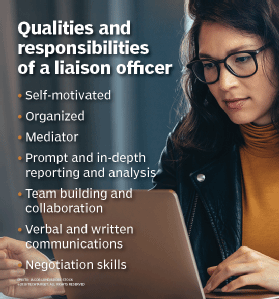
Syda Productions - stock.adobe.c
What are the roles and responsibilities of a liaison officer?
While liaison officer responsibilities vary depending on the company they work for, their strong organizational and communications skills make them critical to incident response.
A liaison officer is an employee who builds and maintains mutually beneficial relationships, facilitates communications and coordinates activities among two or more people, agencies or organizations. Often a member of the public relations team, liaison officers are company representatives that streamline operations and handle public communications, coordination efforts, incident response and conflict resolution. They act as technical or subject matter experts for the person, agency or organization they represent.
Liaison officers are the point of contact at enterprises during major events, such as emergency situations or leadership changes, like the appointment of a new CEO. They are also the primary people who communicate information about these events for promotional and brand perception purposes.
Types of liaison officers
Liaison officers work in the public and private sector and are often employed by educational institutions, governments, law enforcement, militaries and large organizations. While their communication-related tasks typically remain the same, liaison officers' specific responsibilities vary depending on the employer.
For example, a governmental multicultural liaison officer may work with foreign embassy workers to build relationships among countries and agencies to help overcome language barriers and cultural differences. At a university, a school liaison officer may negotiate among the superintendent, the board of education and the broader community of teachers, students and parents for conflict resolution.
In the military, liaison officers' responsibilities could include acting as commanding officers' personal representative to allied forces and as a communications bridge between the commander and other liaisons, commanders and staff officers.
Within the context of enterprises and infosec, the liaison officer is responsible for coordinating multiagency responses to a breach, hack or attack. The need for this role is clear: In the event of a serious breach, incident or other emergency situation, multiple resources and agencies must be brought to bear for effective incident response -- an effort that requires quick and efficient coordination.
Liaison officer responsibilities and skills
A liaison officer works in fast-paced, high-pressure environments and must be willing to take initiative to proactively solve conflicts and address issues. Liaison officer duties include the following:
- acting as contact points for all agency or organizational personnel;
- keeping lists of the agencies or personnel representing the person, agency or organization;
- facilitating meetings and cooperation among people, agencies and organizations;
- identifying problems in communications among these groups;
- collaborating and communicating with necessary constituents and the public; and
- conducting post-mortems when an incident is wrapped up.
As their primary task is to coordinate activities and communications among people, agencies and organizations, successful liaison officers must showcase strong organizational skills. They prepare and deliver verbal communications, such as press conferences, interviews, phone calls and face-to-face meetings, and written communications, including press releases, reports and social media updates, to colleagues, collaborators, the public and other stakeholders.

Liaison officers must be self-motivated and strong leaders capable of promptly and effectively monitoring, coordinating and communicating strategic objectives. Liaison officers often serve as mediators, so their duties also include negotiating with others, developing and fostering relationships, getting people to understand others' points of view, and understanding their parent business and how it impacts its stakeholders.
Event reporting and analysis are included in liaison officer responsibilities. These involve compiling reports on incidents, events or updates to learn from them and improve future processes and relationships.
When it comes to experience and education, potential liaison officers should hold a postsecondary associate or bachelor's degree, often in business, criminal justice, international relations, management or political science, depending on the organization's field of business. Additional education may be required as well. For example, liaison officers working at public safety departments may need to complete mandated training requirements for that department.







